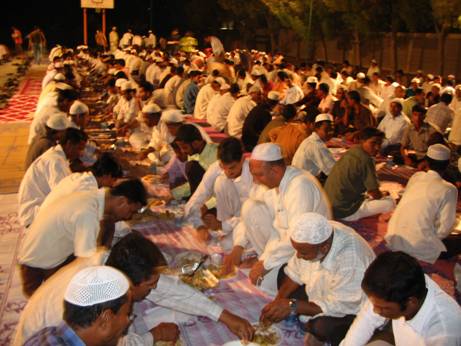ISLAM IN A NUT-SHELL
SAUM: ANOTHER PRECIOUS RUKUN OF ISLAM
Continued from previous issues .... ... ... ... ...
Sabiran Khatoon, (Sabirankhatoon@yahoo.com)
Islam
is such a religion that cares for all of us in totality, whether for
heavenly abode or life on earth, starting form birth to death and the
last day of judgment i.e. Quiyamat and even after that. Saum i.e.
fasting during the month of Ramadan is obligatory for all healthy,
adult, men & women of the age of 10 years and above. Though, it is
advisable to start fasting at the age of 7 years but must by the age of
10
years.
I
am to recall that SAUM-O-SALAT are very-very important duties to be
performed by the followers of Islam. It is evident in history that
fasting is observed on various occasions and in almost all religion of
the world. The followers of Hazrat Mohammad (SAW), Hzt. Moosa (AS),
Hzt. Ibrahim (AS), Hzt. Daud (AS), Hzt. Isa (AS) and many more have
performed fasting.

The
present form of fasting in Islam came after the incarnation
(Shab-E-Meraj) of Mohammad (SAW). Apart from other messages, he brought
a month of Ramadan (fasting) for the betterment of his ummah.
SAUM is a fasting of a month in the 9th month of Islamic Calendar, called Ramzan (Ramdan).
The Islamic (Hijri) year consists of twelve (purely lunar) months:
(1)
Muharram (2) Safar (3) Rabbi` ul-Awwal (4) Rabbi` ul-Thaany (5) Jumaada
al-awwal (6) Jumaada al-Thaany (7) Rajjab (8) Sha`baan (9) Ramadhaan
(10) Shawwal (11) Thw al-Qi`dah (12) Thw al-Hijjah
Importance of SAUM as per Islam:
One should abstain from eating, drinking, in-taking of any
foreign materials like liquid, solid, semisolid or in whatever form they be, he/she is forbidden from all the deeds like segregation,
interception, physical intimacy, telling lie for no reason, abuse,
either to see or to rehearse any wrong deeds or to hear, starting from
sunrise to sunset following certain rulings, some of which
are noted below:
Initialization:
Sehari, which is also called as the first breakfast before starting
Roza, though, it is not essential but it is taken as Sunnah for
ones relief. This must be completed before the Adhan of Fajr (Early
morning).
>> One must be purified from all physical impurities, tangible or intangible.
>>
In the early morning, one takes a light meal, known as SEHARI.
| 

>> Whole day one is debarred
from taking any kinds of liquid/water and, food, etc. It means one is
completely in starvation. (From dawn to dusk)
>> At the sun set, one breaks the fast by a meal which is called “IFTAR”
>> Iftar is a closing/breaking of fasting. Thereafter, every thing is normal subject to certain prohibitions.
>>
During fasting, one should be highly alarmed with the prohibition from
telling a lie, not to harass any body, and complaints to be avoided as far
as possible. Namaz is performed as usual and they enchant Quran and
offer more and more Nafil namaz etc.
>>
One performs the prayer (Namaz) of traweeh, for the whole month either
reciting Quraan himself or by listening to a Hafiz.
Fasting (Saum) has following benefits/importance.
>> It is obligatory in Islam.
>> It purifies the soul, physique, blood, thought, action etc.
>>
It teaches us the importance of food and water, in our life and lessons
us to feed the needy. It makes one realize the pain of thirst and hunger thus encouraging him to help people who may be starving.
>>
As per medical science, fasting is essential for healthy body. It gives
rest to & overhauls the entire digestion system. etc.
>> It increases absorption capacity of intestines.
>> It lowers cholesterol level in the body.
>> There are so many social benefits related to fasting.
>>
It helps to understand that the material, which someone has stored for his future use, could be immediately needed by others.
>> Degree of contribution towards the society.
>> It teaches not to do hoardings and black marketing.
>> It discourages smoking, alcoholism and other addictions.
Fasting
of Ramadan is for one lunar month. At the end of Ramadan, on visibility
of moon, Muslims throughout the world enjoy the day of happiness
“Id-ul-fitar”. On the day of Id, Muslims gather to offer Namaz to thank
the supreme power Allah for providing such an oppotunity (of fasting) and its successful
observance.
 |

 Download pdf (3.1 mb)
Download pdf (3.1 mb)